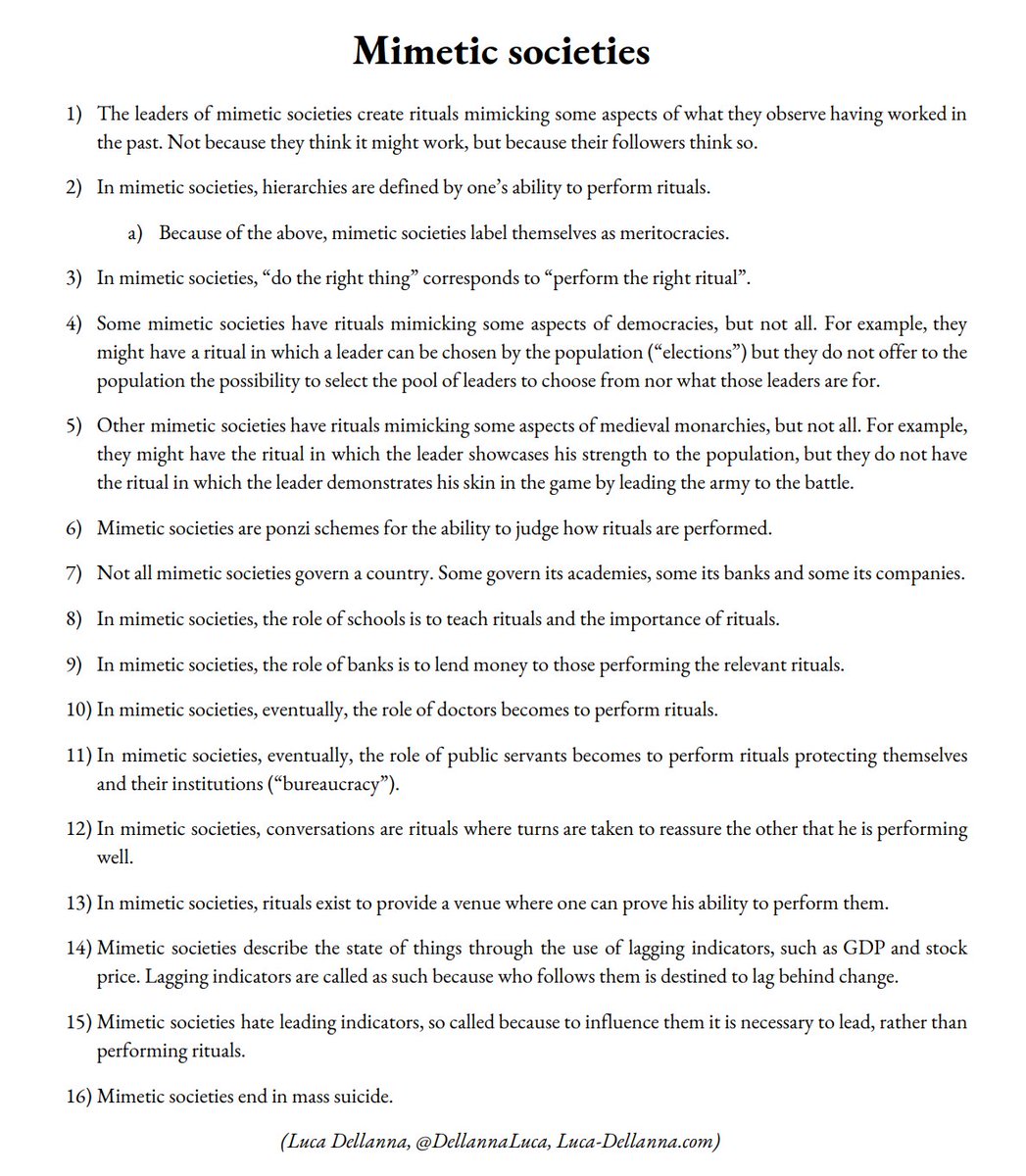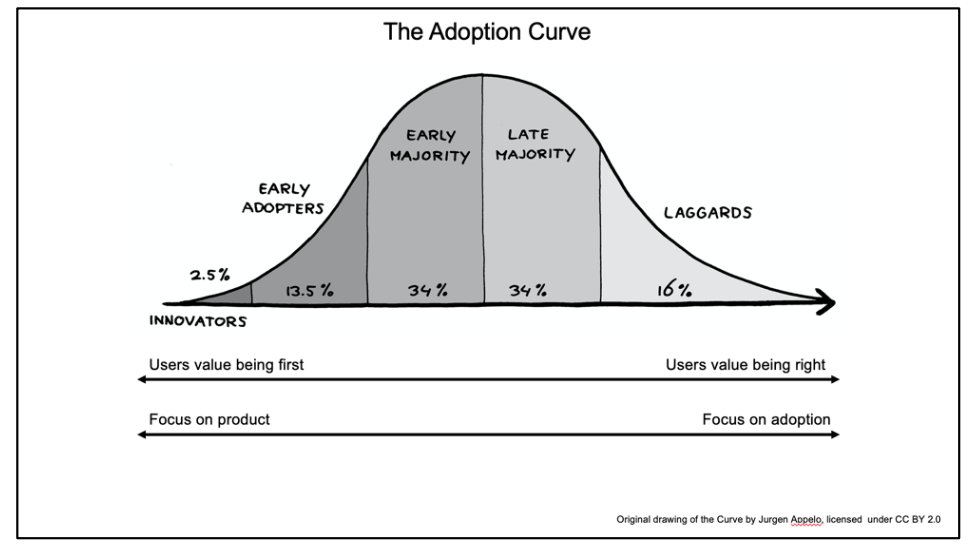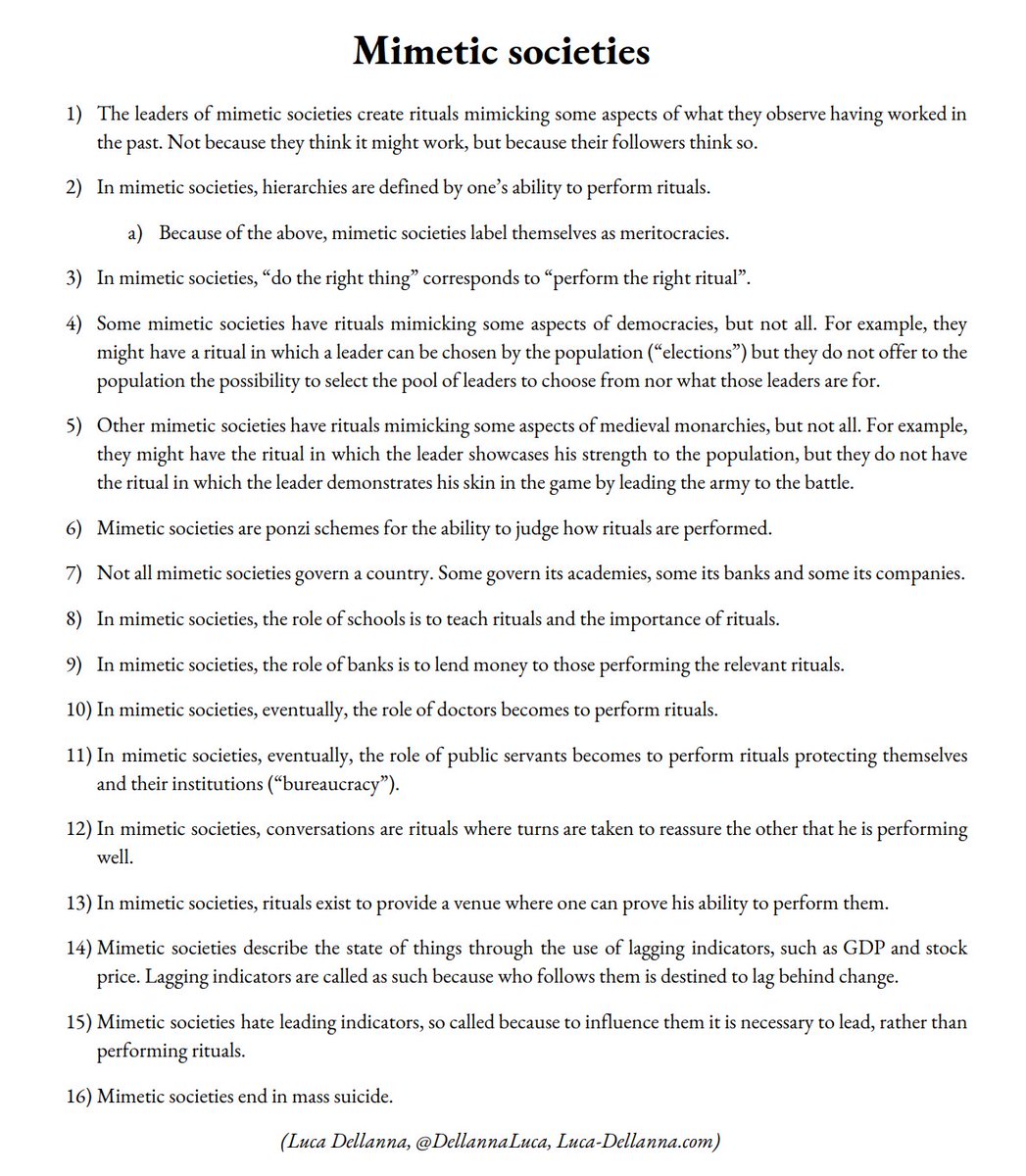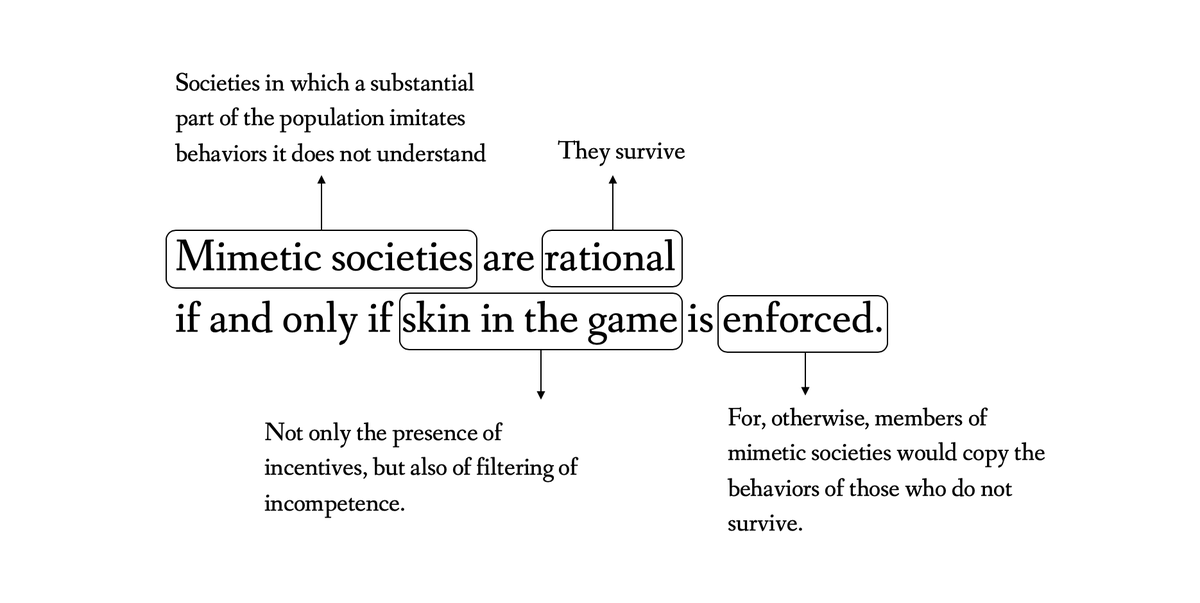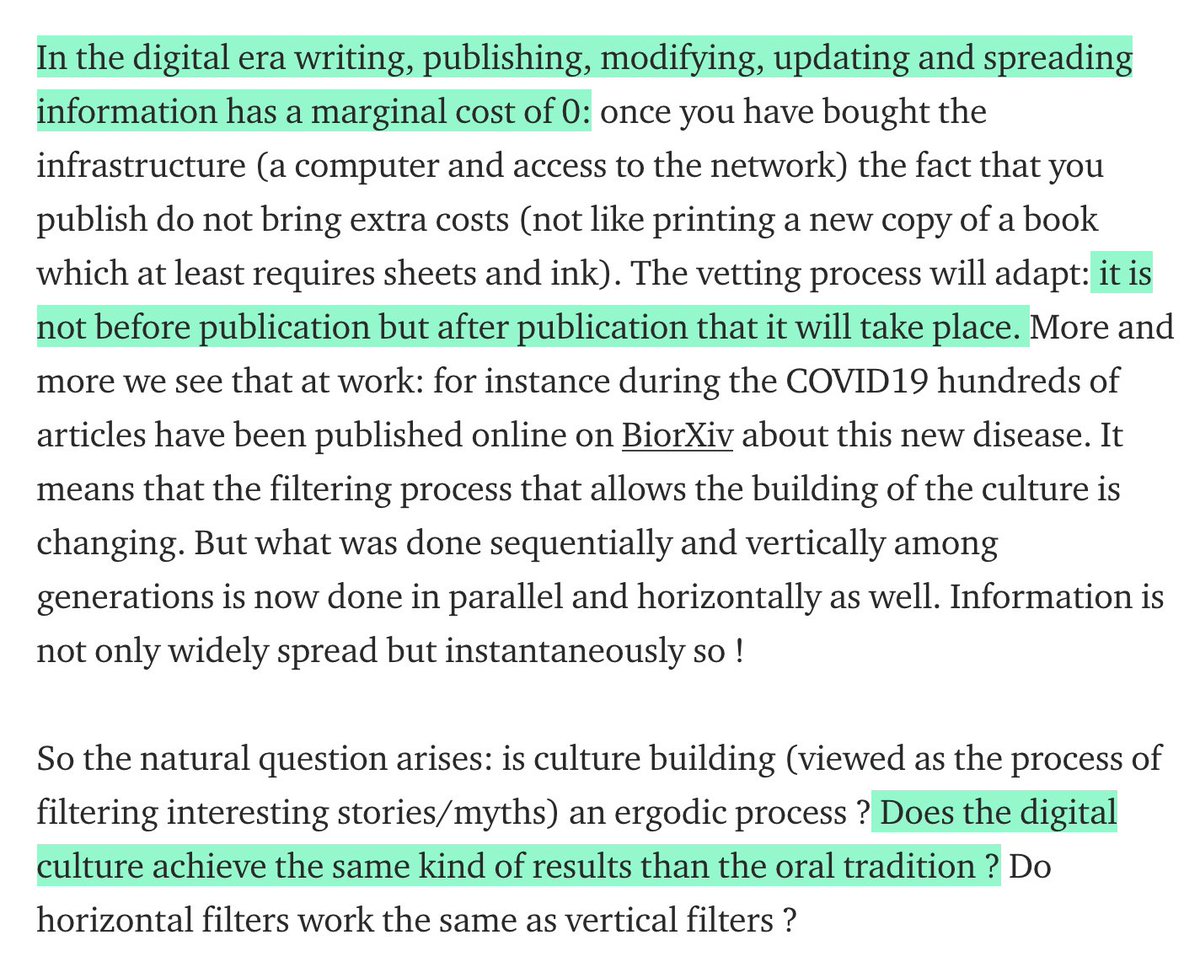We live in a MIMETIC SOCIETY, in which right and wrong are largely determined by what others do, can do, and are expected to do. Imitation is the norm.
It seems irrational, but it increases survival, *under the right conditions*.
(thread, 1/N)
It seems irrational, but it increases survival, *under the right conditions*.
(thread, 1/N)
2/ Using popularity as a proxy for right or wrong is often a good risk management strategy.
Not only to manage social risk (eg, losing friends due to an unpopular action) but also to manage other kind of risks (eg, visiting McDonald's when in a foreign city to avoid stomachache).
Not only to manage social risk (eg, losing friends due to an unpopular action) but also to manage other kind of risks (eg, visiting McDonald's when in a foreign city to avoid stomachache).
3/ Imitation is not as naive a strategy as it looks like. In a world where people are subject to natural selection, on average, imitation necessarily means imitation of those who survived.
Hopefully, implying that we imitate behaviors that promote survival.
Hopefully, implying that we imitate behaviors that promote survival.
4/ In the modern world, in which natural selection is much weaker (at least natural selection from the environment), instead, we might end up imitating the unfit.
5/ Moreover, people are differently subject to mimetic forces.
A small portion of the population is made of "independent thinkers".
(In the picture below, it would be the "innovators".)
A small portion of the population is made of "independent thinkers".
(In the picture below, it would be the "innovators".)
6/ I wouldn't be surprised if the optimal survival strategy at the species level were "most, mimetic; few, independent".
7/ The independent thinkers take risks. If and only if they are successful, the larger population follows them.
8/ (Side note: this thread pains me, as intellectual independence is a value I cherish much; however, I try to be objective in my observations of nature.)
9/ I always wondered whether gullibility is a naturally-selected trait, for it leads to survival, in a measure.
I wonder if we not only evolved intelligence, but also variance on intelligence.
I wonder if we not only evolved intelligence, but also variance on intelligence.
10/ As an example, basketball player James Harden was the 2018 Most Valuable Player. Would a team of 5 James Hardens beat a balanced team of 5 all-stars? Probably not.
Nature loves variance, for it is required for specialization and for adaptation – both which increase fitness.
Nature loves variance, for it is required for specialization and for adaptation – both which increase fitness.
11/ Back to imitation. When making a choice, once must weight his own knowledge versus the knowledge of others (that would produce imitation).
The weight is the probability that one is right and the others wrong.
Under natural selection, the weight is very low (as per tweet #3).
The weight is the probability that one is right and the others wrong.
Under natural selection, the weight is very low (as per tweet #3).
12/ Imitation without fundamental know-how is much of what I stand against. And yet, the right question to ask is, does it help survival?
13/ The answer probably comes from Skin In The Game (as defined in Taleb's work).
A filtering system that ensure that only those who have behaviors which promote survival survive, so that only pro-survival behaviors are copied, for the most part.
A filtering system that ensure that only those who have behaviors which promote survival survive, so that only pro-survival behaviors are copied, for the most part.
14/ Mimetic societies, instead, whereas based on a rational behavior (imitation), they degenerate when they remove skin in the game. See points #2, #11, #16 below.
15/ I would therefore conclude:
- in general, imitation is good*;
- imitation in a society without skin in the game is a dangerous condition.
(*): provided a small percentage of the population is an independent thinker.
- in general, imitation is good*;
- imitation in a society without skin in the game is a dangerous condition.
(*): provided a small percentage of the population is an independent thinker.
16/ Last-minute update: the contents of this thread will become an appendix chapter of my upcoming book "The Control Heuristic", 2nd edition ( http://gum.co/heuristic )
17 / Posting here @davidboxenhorn’s excellent essay, which I only recently discovered but closely relates to the contents of this thread: http://brianoflondon.me/mundia-and-modia
18/ Adding here the contents of this essay
http://medium.com/@frd.prost/ergodicity-and-digital-culture-13ba17989890
http://medium.com/@frd.prost/ergodicity-and-digital-culture-13ba17989890
19/ Scammers (example  ) and casinos artificially inflate crowds to compensate for Skin In The Game taking out those going bust, and thus hijacking our imitation heuristics (“imitation is good because SITG ensures that those practicing risky behavior aren’t around to imitate”). https://twitter.com/SimonDeDeo/status/1351192090328391686
) and casinos artificially inflate crowds to compensate for Skin In The Game taking out those going bust, and thus hijacking our imitation heuristics (“imitation is good because SITG ensures that those practicing risky behavior aren’t around to imitate”). https://twitter.com/SimonDeDeo/status/1351192090328391686
 ) and casinos artificially inflate crowds to compensate for Skin In The Game taking out those going bust, and thus hijacking our imitation heuristics (“imitation is good because SITG ensures that those practicing risky behavior aren’t around to imitate”). https://twitter.com/SimonDeDeo/status/1351192090328391686
) and casinos artificially inflate crowds to compensate for Skin In The Game taking out those going bust, and thus hijacking our imitation heuristics (“imitation is good because SITG ensures that those practicing risky behavior aren’t around to imitate”). https://twitter.com/SimonDeDeo/status/1351192090328391686

 Read on Twitter
Read on Twitter